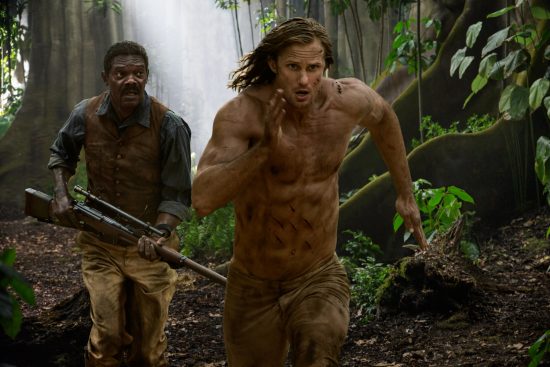Review: The Legend of Tarzan
The Tarzan concept as we all know it – the aristocratic offspring of a British Lord adopted and raised by apes to become a superhuman jungle man who conquers the African wilderness – is an unavoidably problematic one. Not only are its roots in racist and colonial politics troublesome to say the least, it’s also so damn silly. How to deal with such a property?
You could decide never to make a Tarzan film again and leave it to disappear like the anachronism it probably is, or you could do a Nolan and revise the mythos for contemporary times with added maturity. Warner Bros. predictably chose the latter. Indeed, Batman is another character of equally silly pulp origins who, as it turned out, still had plenty to say about our current world and made a pile of money in the process. The Legend of Tarzan doesn’t achieve, nor even aspire to, the same intellectual and thematic heights of The Dark Knight Trilogy, but it does challenge its own legacy as far as it can while preserving the essence of Edgar Rice Burroughs creation. By applying an anti-colonial narrative inspired by real history and a healthy dose of self-reflexivity, The Legend of Tarzan treats itself seriously while never forgetting to include enough absurd boyish adventure and the character’s essential appeals. It’s certainly the best Tarzan film made to date. Not even Phil Collins can stop that one.
Pre-Highlander Christopher Lambert starred in the last major live-action film adaptation, Greystoke: Legend of Tarzan, Lord of the Apes (1984). While this also attempted to treat the Tarzan legend earnestly, focusing on the character’s displacement and sense of isolation in a well-bred society, it is more like watching an even more boring Chariots of Fire than a pulp hero escapade. Fortunately, director David Yates (Harry Potter and The Deathly Hallows) completely understands Tarzan’s attraction, both at his original conception and now. It ain’t themes of displacement, I can tell you that. It’s sex and adventure. Tarzan was conceived during a crisis of masculinity, when men were increasingly losing their individuality and agency in white-collar nine-to-five occupations. Tarzan’s survival skills, this exaggerated vision of masculinity and superhuman strength read as pure fantasy escapism to these men and boys. For women, constrained by oppressive and dogmatic Victorian notions of morality and sexual conduct, in swings Tarzan’s animalistic and primordial virility to get the knees wobbling. In our current era of neoliberal corporate beauracracy, Yates intelligently plays to these relevant desires. We find Jane Poter (Margot Robbie) and Lord Greystoke (Alexander Skarsgård) not in the jungle as one may expect of a Tarzan film, but in their stuffy manor home as Lord and Lady, physically distant from each other and buttoned up in their waistcoats and corsets. Their return to the Congo has narrative reason, but it is also a gradual descent into primal instincts of sex, violence and the revelation of abs. A sub-plot concerning the couples lack of offspring plays into this. Once out in the jungle on a rollicking adventure, their relationship gets a bit more animalistic with added vivacity. The most memorable scene occurs when in the moonlight of the jungle; Jane hears the mating calls of the animals and her husband. A raunchy scene ensues. While stories in the press suggested the scene was so intense that Margot Robbie punched Alexander Skarsgård, we can only assume this was cut alongside some more explicit moments of violence which is awkwardly edited out in the name of that family-friendly rating. I imagine there will be an uncut version on DVD. I hope so, for it is these moments of earthly raw passion that elevate the spectacle and drama.
The casting of Skarsgård is certainly an inspired decision. His physique obviously plays into the sex appeal (and will indeed get all of the attention), but the nuances of his acting must be praised too. Perfecting the English accent, he also embodies the internalized angst and trauma of an English Lord raised by hyper-aggressive CGI monkeys. But surely Samuel L. Jackson has earned the right to be above the comic black sidekick role? We can debate the virtues of his role, but he certainly delivers on comic relief, especially when it comes to licking gorilla testicles. However, following his awfully banal work in Spectre, Christoph Waltz’s bad-guy shtick is getting tiresome to the detriment of his potential. And while Margot Robbie is perfectly satisfactory as Jane Porter, her pseudo-feminist defiance is superseded by her damsel position.
It must be said: like Dances with Wolves (1992) and Avatar (2009) before it, this is yet another exercise of guilt cleansing for white folk. While the anti-colonial theme is well-intentioned, the idea of an exceptional white man of aristocracy saving the deprived black people from European colonialism is somewhat uncomfortable when considering the real history that the film bestows itself too. We may leave the cinema pleased that the hero saved the day, but history books tell it differently and we can’t course-correct that in our fantasy escapism. So while the screenwriters use of real history and real figures intends to treat the subject with the gravitas it deserves, it also implies that history took a turn for Hollywood conclusions by the gracious intervention of white altruism. You mesh silly fictional myth with sensitive reality and you should tread more carefully. However, I’d love to see how they could improve on this with a more radical sequel (lets assume that this is possible in the Tarzan mythos). If so, The Legend of Tarzan II could be just as fun and visually imaginative as this reboot, while being something that truly belongs to our current era.











